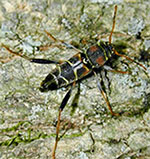Environmental and Evolutionary Entomology
 Research in this area of endeavor involves basic and applied studies of invertebrates from the perspective of their status, biodiversity, and role in the environment at various spatial scales that span specific landscapes or habitats to entire geographic ranges. It also involves the discovery and delineation of evolutionary relationships within and among certain groups of organisms. Research findings are used to provide natural and predictive classifications, contribute to biotic inventories, gain insights into historical biogeography, and understand ecological phenomena such as host and microhabitat specificity and selectivity, and behavioral patterns and adaptive capabilities associated with dispersal, colonization and survivorship. Furthermore, such studies—especially given the inherent high diversity, rapid growth and reproduction, and critical ecological roles of invertebrates—are ideally suited for investigating ecosystem services and addressing timely environmental policy and management issues including habitat protection, species rarity and conservation, effects of environmental quality and climate change, and threats of invasive species. The research interests of our faculty in this area are as follows:
Research in this area of endeavor involves basic and applied studies of invertebrates from the perspective of their status, biodiversity, and role in the environment at various spatial scales that span specific landscapes or habitats to entire geographic ranges. It also involves the discovery and delineation of evolutionary relationships within and among certain groups of organisms. Research findings are used to provide natural and predictive classifications, contribute to biotic inventories, gain insights into historical biogeography, and understand ecological phenomena such as host and microhabitat specificity and selectivity, and behavioral patterns and adaptive capabilities associated with dispersal, colonization and survivorship. Furthermore, such studies—especially given the inherent high diversity, rapid growth and reproduction, and critical ecological roles of invertebrates—are ideally suited for investigating ecosystem services and addressing timely environmental policy and management issues including habitat protection, species rarity and conservation, effects of environmental quality and climate change, and threats of invasive species. The research interests of our faculty in this area are as follows:
